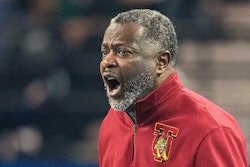Cornerback is generally regarded as the position in the National Football League (NFL) where some of the fastest and most athletic players are placed. The position requires tremendous forward, backward, and lateral speed and quickness. It requires one to defend wide receivers that may have speed that approaches the level of Olympic track athletes.
The last White cornerback to start a game in the NFL was Jason Sehorn and he retired at the end of the 2003 season. Let’s unpack some potential reasons for this and what lessons can potentially be applied to higher education.
Stereotypes certainly play a key role. White players in some quarters are stereotyped as not having the requisite speed and quickness to be able to excel at the cornerback position. This likely prevents young White players from attempting to play the position, coaches from placing them in the position and college recruiters from recruiting them to play the position.
The stereotype is so dominant that many young players likely remove themselves from the competition for spots before it even begins. This is an example of the kind of psychological consequences that deeply embedded stereotypes can have.
LaVar Ball, the father of former UCLA star freshman point guard Lonzo Ball, recently made headlines by saying after UCLA’s loss to Kentucky in the NCAA Basketball Tournament that “realistically you can’t win no championship with three White guys because the foot speed is too slow.”
He verbalized openly what many people may have thought, but only discussed privately. It would be hard to gauge the internal and external impact of this stereotype on White players who aspire to play positions in the NBA and NFL that require elite foot speed in order to excel.
There is a presumption of slowness for White players that exists in the minds of many. They often have their ability questioned more frequently and are scrutinized more harshly when competing for positions and playing time. These stereotypes represent powerful identity contingencies that aspiring White cornerbacks have to face.















